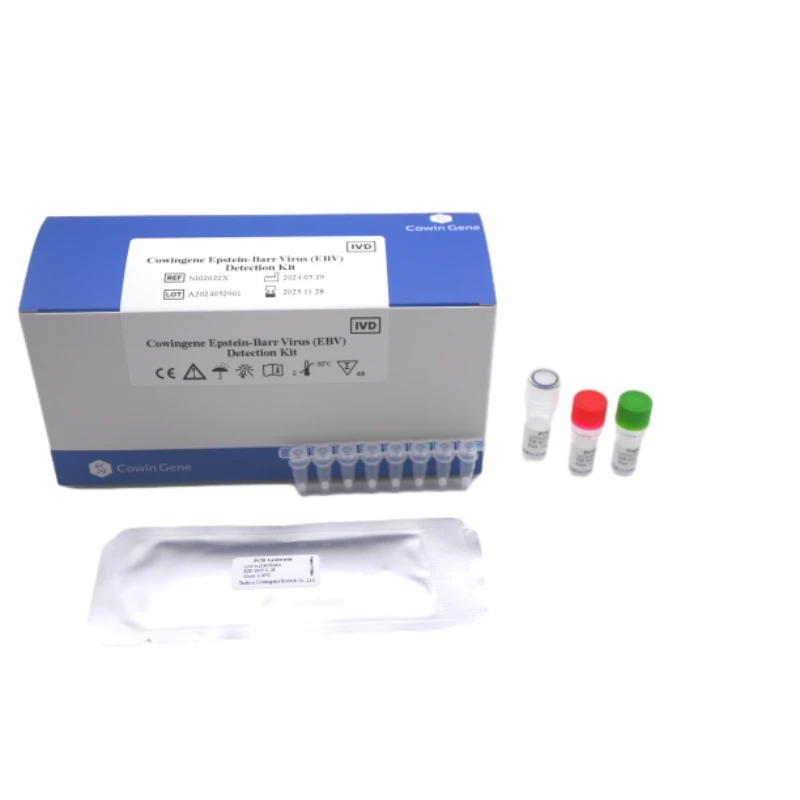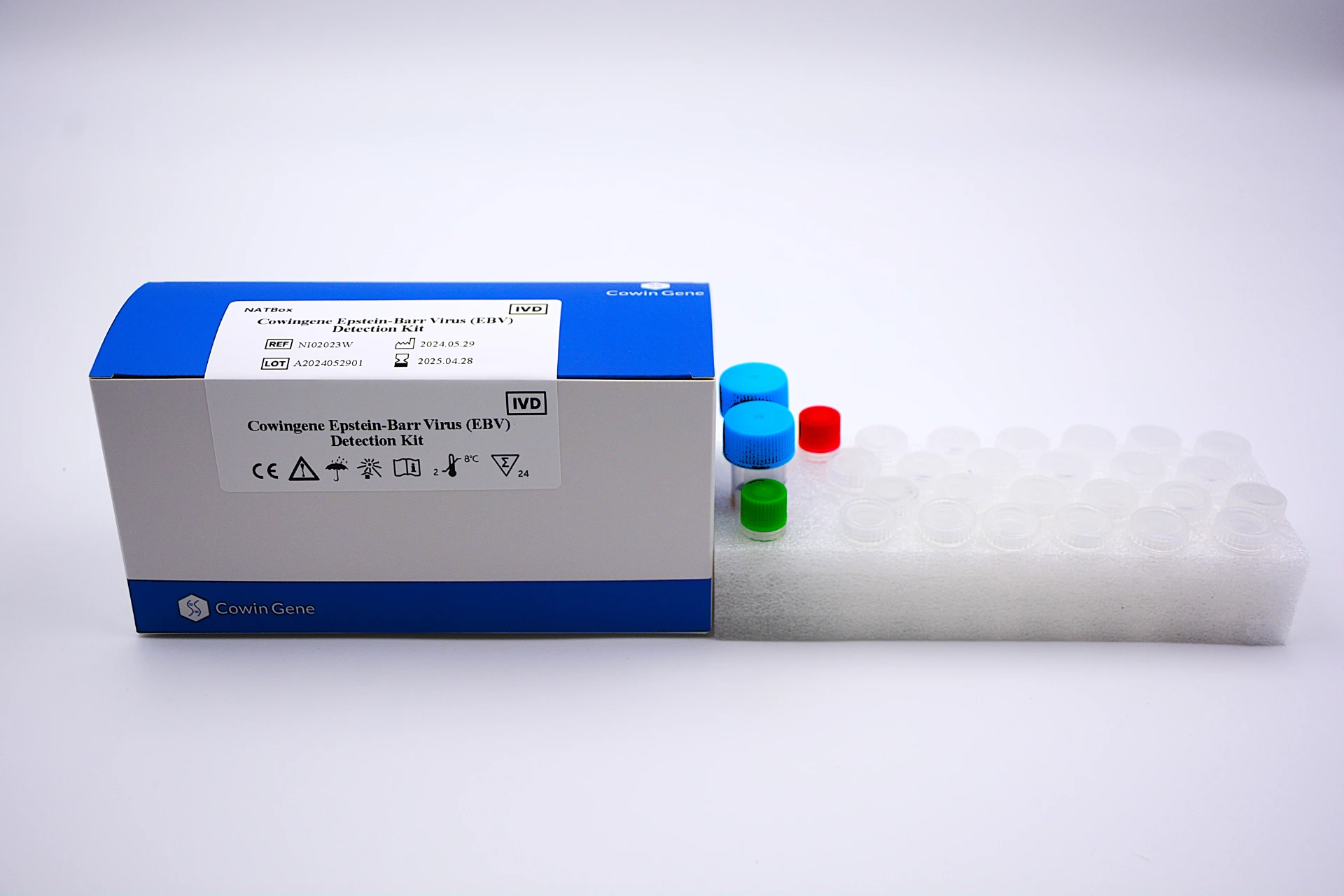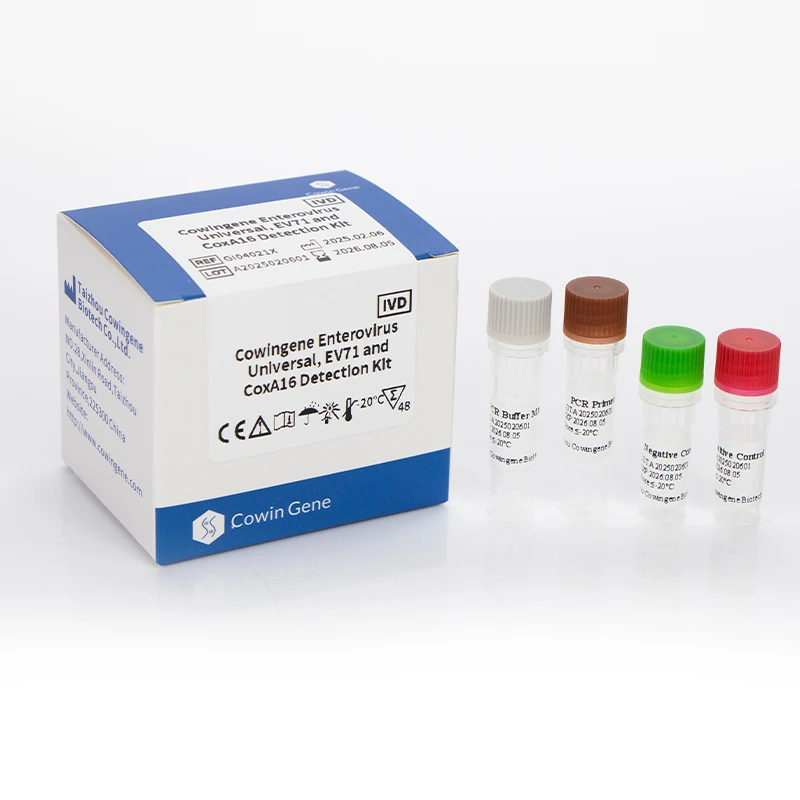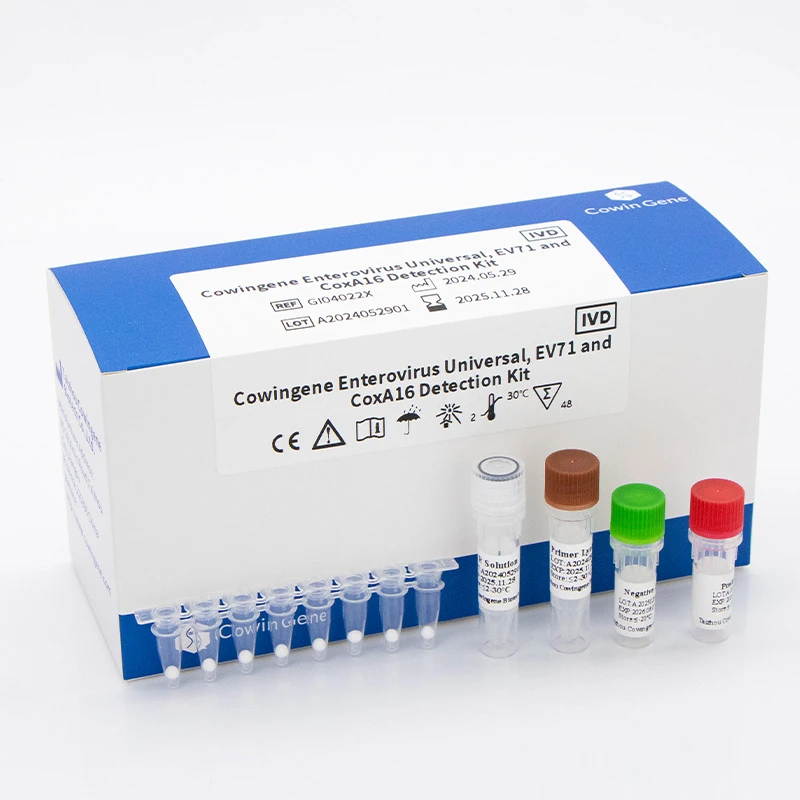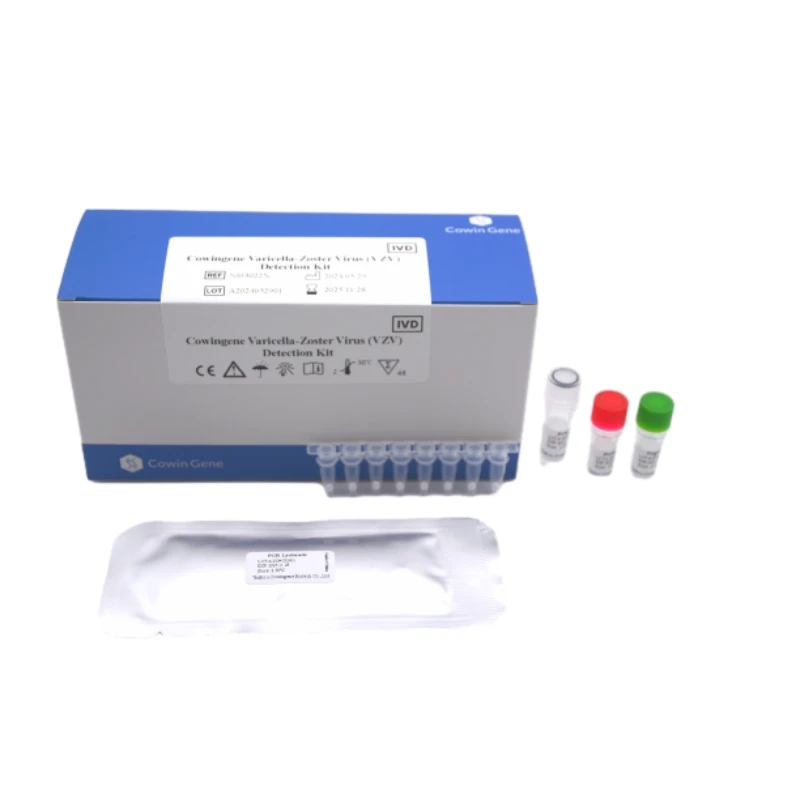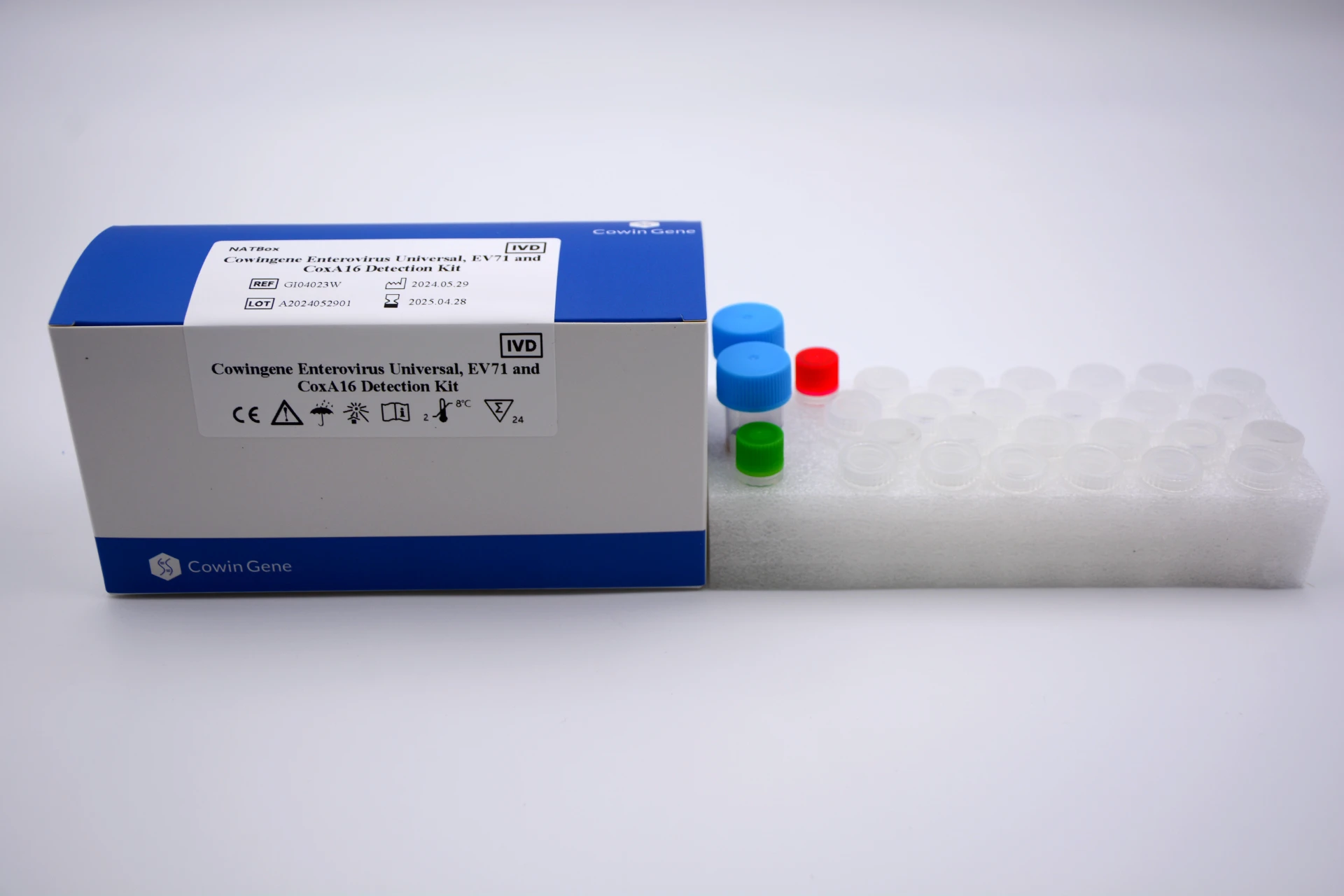Sep . 09, 2025 22:40 Back to list
Rapid & Accurate HCV Detection Kit | Reliable Results
Introduction to Advanced HCV Detection Solutions
Hepatitis C Virus (HCV) infection remains a significant global health concern, affecting millions worldwide and leading to chronic liver disease, cirrhosis, and hepatocellular carcinoma if left untreated. Early and accurate diagnosis is paramount for effective disease management, prevention of transmission, and improved patient outcomes. In response to this critical need, advanced diagnostic tools, such as the HCV detection kit, have become indispensable in clinical diagnostics, blood screening, and epidemiological surveillance. These kits offer rapid, reliable, and accessible methods for identifying HCV infection, facilitating timely intervention and reducing the global burden of the disease. Cowingene is at the forefront of developing high-performance diagnostic solutions, leveraging cutting-edge immunoassay technology to deliver superior accuracy and user-friendliness.
Current Industry Trends in HCV Diagnostics
The landscape of HCV diagnostics is continuously evolving, driven by technological advancements and the global push for HCV elimination. Key industry trends include:
- Point-of-Care Testing (POCT): There's a strong emphasis on developing POCT HCV detection kit solutions that provide rapid results outside traditional laboratory settings. This is crucial for reaching underserved populations and facilitating immediate linkage to care. Technologies like lateral flow immunoassays are central to this trend, offering simplicity and speed.
- Enhanced Sensitivity and Specificity: Continuous innovation aims to improve the analytical performance of assays. This involves optimizing antigen-antibody interactions, utilizing novel detection labels, and refining assay designs to minimize false negatives and false positives, even in early infection stages or with low viral loads.
- Integration with Digital Health: Diagnostic devices are increasingly being designed for connectivity, allowing for seamless data capture, reporting, and integration with electronic health records. This trend supports better surveillance, disease management, and public health interventions.
- Cost-Effectiveness and Accessibility: As global efforts intensify to combat HCV, there is a growing demand for affordable diagnostic solutions, particularly in low- and middle-income countries. Manufacturers are focusing on economies of scale and simplified manufacturing processes to reduce the hcv kit price, making testing more accessible.
- Pan-Genotypic Detection: HCV exists in multiple genotypes. Diagnostic kits are being developed to detect antibodies or RNA across all major genotypes, ensuring broad applicability and avoiding genotype-specific false negatives.
These trends collectively aim to make HCV diagnosis faster, more accurate, and more accessible, aligning with the World Health Organization's (WHO) global health sector strategies to eliminate viral hepatitis as a public health threat by 2030.
Detailed Process Flow: Manufacturing an HCV Detection Kit
The manufacturing of an HCV detection kit, particularly for immunoassay-based lateral flow devices, is a sophisticated biochemical and engineering process. Unlike heavy industry components that involve casting, forging, or CNC machining, the production of diagnostic kits focuses on precise reagent formulation, membrane coating, and intricate assembly under controlled environments. The process ensures high-quality, reproducible, and reliable diagnostic tools.
Key Stages of Manufacturing:
-
Reagent Synthesis & Purification:
- Materials: Highly specific recombinant HCV antigens (e.g., Core, NS3, NS4, NS5 regions) and monoclonal antibodies are synthesized or sourced. Gold nanoparticles are prepared for conjugate formation.
- Process: Antigens are selected for their immunodominance and ability to elicit a strong antibody response. Antibodies are chosen for their high affinity and specificity to HCV antigens. Gold nanoparticles are functionalized for covalent attachment of detection antibodies. All reagents undergo rigorous purification to ensure high purity and stability.
-
Membrane Preparation & Coating:
- Materials: High-quality nitrocellulose membrane (for test and control lines), fiberglass or polyester non-woven fabric (for sample and conjugate pads), absorbent cellulose pad.
- Process: The nitrocellulose membrane is precisely coated with purified HCV antigens (test line) and a control antibody (control line). These are precisely dispensed using automated coating systems to ensure uniform line formation. The conjugate pad is coated with gold-conjugated anti-HCV antibodies. These membranes and pads are then dried under controlled humidity and temperature.
-
Strip Assembly:
- Process: The treated nitrocellulose membrane, conjugate pad, sample pad, and absorbent pad are laminated onto a plastic backing card using precise automated machinery. Each component is positioned with critical alignment to ensure proper capillary flow. This composite material forms the diagnostic strip.
-
Cutting & Cassette Assembly:
- Process: The laminated sheets are cut into individual strips of uniform size. Each strip is then carefully inserted into a pre-molded plastic cassette, which provides structural integrity, protects the strip, and defines the sample well and result window.
-
Quality Control & Packaging:
- Testing Standards: Manufacturing adheres to stringent quality management systems such as ISO 13485:2016 for medical devices. Each batch undergoes rigorous testing for analytical sensitivity, specificity, accuracy, precision, inter-batch consistency, and stability.
- Process: Kits are sealed in foil pouches with desiccants to protect them from moisture, then packaged into boxes along with buffers and instructions for use.
Service Life & Target Industries:
The typical service life (shelf life) for an HCV kit ranges from 12 to 24 months when stored under specified conditions (typically 2-30°C). This ensures diagnostic efficacy over a practical period for clinical laboratories and public health programs.
Target industries for these kits include:
- Clinical Diagnostic Laboratories: For routine patient screening and diagnosis.
- Blood Banks & Transfusion Centers: Mandatory screening of blood donations to prevent transfusion-transmitted HCV.
- Public Health Programs: Mass screening initiatives in high-prevalence areas.
- Research & Academic Institutions: For epidemiological studies and seroprevalence assessments.
- Emergency & Humanitarian Aid Organizations: Deployment in remote or resource-limited settings for rapid diagnosis.
Advantages in Application Scenarios:
In typical application scenarios, such as a large-scale screening program in a remote community, the advantages of a well-engineered HCV detection kit are clear. For example, the Cowingene HCV Detection Kit offers:
- Energy Saving: As a rapid immunoassay, it requires no specialized equipment or electricity, making it ideal for low-resource settings, directly contributing to energy saving compared to PCR-based methods.
- Corrosion Resistance & Robustness: The plastic cassette housing is designed to be chemically inert and durable, protecting the test strip from environmental factors and ensuring assay integrity even in challenging field conditions. This design choice highlights a pragmatic approach to diagnostic tool development, ensuring the kit's reliability in various operational environments.
- Ease of Use: Minimal training is required for operation, ensuring broad usability across various healthcare professional levels.
- Rapid Results: Typically provides results within 15-20 minutes, enabling immediate patient counseling and linkage to care.
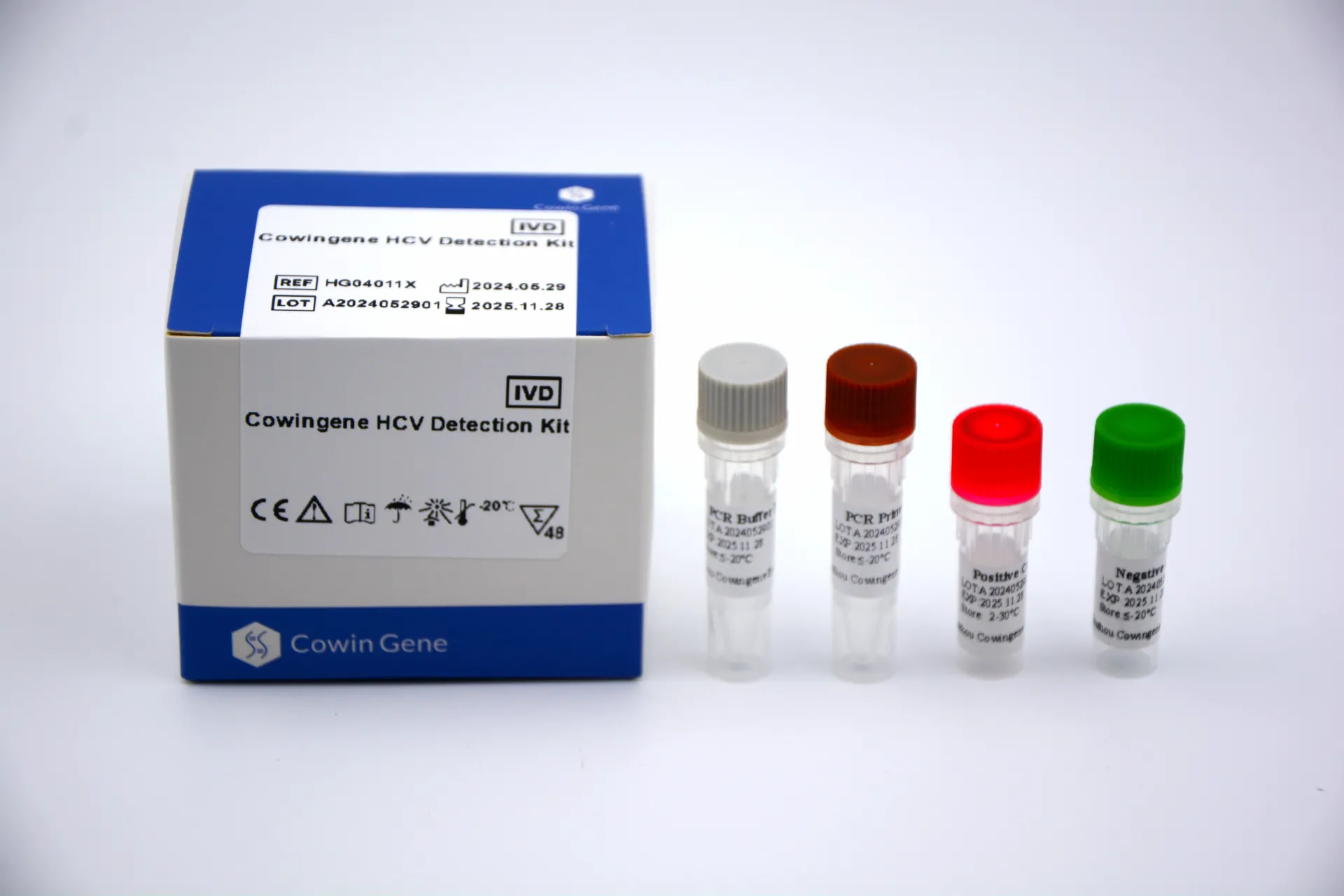
Technical Specifications: Cowingene HCV Detection Kit
The Cowingene HCV detection kit is engineered for optimal performance, ensuring reliable and accurate screening for HCV antibodies. Its design incorporates advanced immunoassay principles to deliver consistent results in various clinical and public health settings.
| Parameter | Specification |
|---|---|
| Product Name | Cowingene HCV Detection Kit |
| Detection Method | Qualitative detection of HCV antibodies (anti-HCV) in human serum, plasma, or whole blood by immunochromatography (Lateral Flow Assay). |
| Sample Type | Serum, Plasma, Whole Blood |
| Assay Time | 15-20 minutes |
| Sensitivity | ≥ 99.5% (Relative Sensitivity, compared to a leading commercial ELISA) |
| Specificity | ≥ 98.0% (Relative Specificity, compared to a leading commercial ELISA) |
| Storage Conditions | 2-30°C (36-86°F) |
| Shelf Life | 24 months from manufacturing date |
| Kit Components | Test cassettes, disposable droppers, sample diluent (buffer), package insert |
| Certifications | CE IVD, ISO 13485 (manufacturing facility) |
These specifications highlight the kit's robust performance characteristics, making it suitable for high-throughput screening as well as individual patient testing. The high sensitivity and specificity reduce the need for repeat testing and ensure confidence in diagnostic results.
Application Scenarios for HCV Detection Kits
The versatility and ease of use of the Cowingene HCV detection kit make it ideal for a wide range of application scenarios, addressing critical needs in public health and clinical practice:
- Routine Clinical Screening: Hospitals, clinics, and general practitioners utilize the kit for initial screening of patients presenting with symptoms suggestive of liver disease or those belonging to high-risk groups (e.g., intravenous drug users, recipients of unscreened blood transfusions, individuals with HIV). The rapid results enable clinicians to make prompt decisions regarding further diagnostic steps, such as viral load testing, and treatment initiation.
- Blood Bank Donor Screening: Ensuring the safety of the blood supply is paramount. Blood banks rigorously screen all donated blood units for HCV antibodies. The Cowingene hcv kit offers a reliable initial screening tool, crucial for preventing transfusion-transmitted infections. Its efficiency supports high-volume testing environments.
- Community-Based Screening Programs: In regions with high HCV prevalence or limited healthcare infrastructure, point-of-care kits are invaluable. Public health initiatives deploy these kits in mobile clinics, outreach programs, and community centers to screen large populations quickly and efficiently, facilitating early case detection and linkage to care, particularly where laboratory access is restricted.
- Emergency and Humanitarian Settings: During public health emergencies, disaster relief, or in refugee camps, rapid and simple diagnostic tools are essential. The robustness and independence from specialized equipment make the HCV detection kit a critical component for initial health assessments and infection control measures.
- Research and Epidemiological Studies: Researchers use these kits for seroprevalence studies, assessing the burden of HCV infection in specific populations, and monitoring the impact of prevention and treatment strategies. The cost-effectiveness and scalability of the rapid test make it suitable for large cohort studies.
The ability to use various sample types (serum, plasma, whole blood) further enhances its applicability, providing flexibility to healthcare providers in different settings. For instance, whole blood testing can be performed rapidly at the point of care with just a finger-prick, eliminating the need for venipuncture and lab processing.
Technical Advantages of Cowingene HCV Detection Kit
The Cowingene HCV detection kit stands out in the market due to several distinct technical advantages, which translate into tangible benefits for users and patients alike:
- High Diagnostic Accuracy: With a relative sensitivity of ≥ 99.5% and specificity of ≥ 98.0%, the kit minimizes the risk of false negatives and false positives. This high accuracy is critical for clinical decision-making, ensuring that infected individuals are identified for treatment and uninfected individuals are not subjected to unnecessary anxiety or further testing. This is achieved through the careful selection of highly purified recombinant HCV antigens (Core, NS3, NS4, NS5) that provide broad genotypic coverage.
- Rapid Turnaround Time (TAT): Delivering results within 15-20 minutes, the kit enables immediate counseling and linkage to care, which is crucial for preventing further transmission and initiating early treatment. This rapid TAT significantly improves patient flow in busy clinics and emergency departments.
- User-Friendly Operation: The kit is designed for simplicity, requiring minimal technical expertise and no specialized equipment. This makes it suitable for diverse settings, including remote clinics and point-of-care environments, broadening access to HCV testing.
- Versatile Sample Compatibility: The ability to use serum, plasma, or whole blood samples offers flexibility. Whole blood testing, particularly with a finger-prick sample, is less invasive and eliminates the need for centrifugation, simplifying sample collection and processing.
- Enhanced Stability and Storage: The kit's robust design and optimized reagent formulation ensure a long shelf life of 24 months at room temperature (2-30°C). This stability reduces storage complexity and costs, making it ideal for procurement and deployment in regions with unreliable cold chain infrastructure.
- Clear and Interpretable Results: The visual interpretation of test and control lines is straightforward, reducing ambiguity and the potential for reading errors. A distinct control line confirms assay validity, building user confidence.
These technical advantages contribute to a cost-effective and highly reliable diagnostic solution, empowering healthcare providers globally in the fight against Hepatitis C.
Vendor Comparison: Cowingene vs. Leading Competitors
In the competitive landscape of HCV diagnostics, various manufacturers offer HCV detection solutions. While all aim for accuracy, key differentiators often include sensitivity, specificity, ease of use, turnaround time, storage requirements, and of course, the hcv kit price. The following table provides a comparison of the Cowingene HCV Detection Kit with two hypothetical leading competitors to highlight its market positioning and value proposition.
| Feature | Cowingene HCV Detection Kit | Competitor A (Premium Brand) | Competitor B (Economy Brand) |
|---|---|---|---|
| Detection Method | Lateral Flow Immunochromatography | Lateral Flow Immunochromatography | Lateral Flow Immunochromatography |
| Sample Types | Serum, Plasma, Whole Blood | Serum, Plasma, Whole Blood | Serum, Plasma |
| Assay Time | 15-20 minutes | 15-20 minutes | 20-30 minutes |
| Relative Sensitivity | ≥ 99.5% | ≥ 99.8% | ≥ 98.0% |
| Relative Specificity | ≥ 98.0% | ≥ 98.5% | ≥ 97.0% |
| Shelf Life (Storage) | 24 months (2-30°C) | 18-24 months (2-30°C) | 12 months (2-30°C) |
| Ease of Use | Excellent (3 steps, minimal training) | Excellent (3 steps, minimal training) | Good (4 steps, basic training) |
| Regulatory Compliance | CE IVD, ISO 13485 | CE IVD, FDA, WHO PQ, ISO 13485 | CE IVD, ISO 13485 |
| Estimated HCV Kit Price (per test) | Competitive (mid-range) | Higher (premium) | Lower (budget) |
As illustrated, the Cowingene HCV detection kit offers a compelling balance of high performance, ease of use, and competitive pricing. While Competitor A might have a marginal edge in regulatory approvals or sensitivity due to a higher price point, Cowingene provides near-equivalent accuracy with better cost-efficiency and excellent logistical advantages like longer shelf life and whole blood compatibility compared to economy brands. This positioning makes Cowingene an ideal choice for organizations seeking high-quality diagnostics without incurring premium costs.
Customized Solutions for Diverse Needs
Cowingene understands that diagnostic needs can vary significantly across different markets, healthcare systems, and research initiatives. Therefore, we offer flexible and customized solutions to meet specific client requirements beyond the standard HCV detection kit offering.
- Bulk Packaging and Configurations: For large-scale public health programs or international aid organizations, we can provide kits in customized bulk packaging, optimized for logistical efficiency and reduced waste. This includes different pack sizes (e.g., 50 tests/kit, 100 tests/kit) or multi-test formats if required.
- Private Labeling (OEM/ODM): We partner with distributors and other diagnostic companies to provide our high-quality HCV kit under their own brand. Our OEM/ODM services ensure that the product meets the partner's branding and regulatory specifications, maintaining the same performance standards.
- Regulatory Support and Market Access: Navigating complex international regulatory frameworks can be challenging. Cowingene provides comprehensive support to help partners achieve local registrations and market access, including providing necessary documentation for submissions to bodies like the FDA (for US market) or specific national regulatory agencies. Our established certifications (CE IVD, ISO 13485) provide a strong foundation for global compliance.
- Customized Training and Technical Support: For large deployments, we offer tailored training programs for healthcare professionals on the proper use, interpretation, and quality control of our HCV detection kit. This ensures optimal utilization and consistent diagnostic accuracy across different user groups.
- Integrated Diagnostic Solutions: Beyond standalone kits, we can explore integrated solutions that combine our rapid tests with other diagnostic modalities or digital health platforms, facilitating comprehensive patient management and data reporting.
Our dedicated R&D and manufacturing teams are equipped to collaborate on these bespoke solutions, ensuring that our products align perfectly with the evolving demands of our global partners.
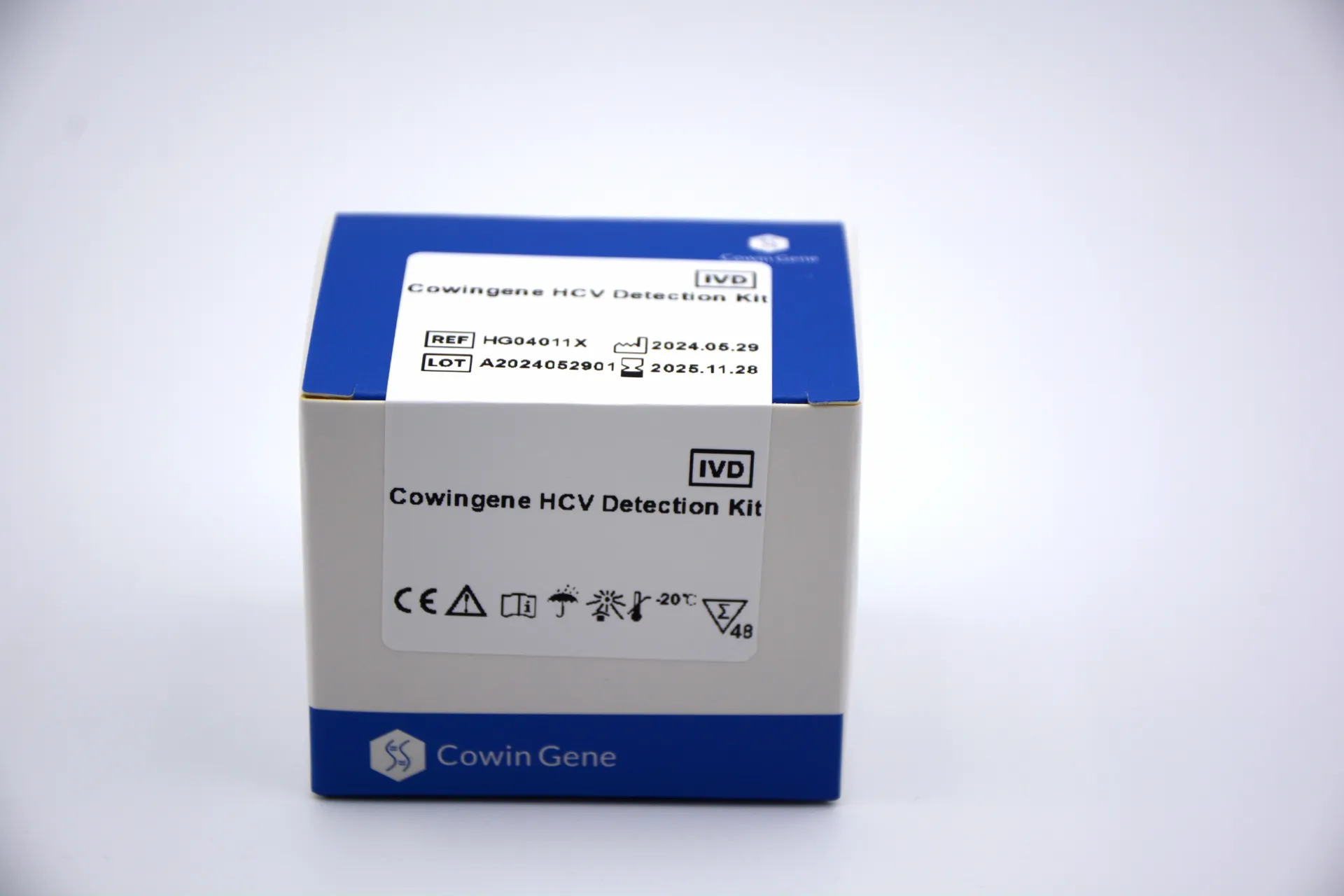
Application Case Studies
Real-world applications demonstrate the efficacy and impact of the Cowingene HCV detection kit in various challenging environments.
Case Study 1: Mass Screening in a Remote African Region
Challenge: A national public health program aimed to screen hundreds of thousands of individuals for HCV in remote, rural areas of Sub-Saharan Africa. The region lacked advanced laboratory infrastructure and consistent electricity, making traditional ELISA or PCR testing impractical. The goal was to identify infected individuals rapidly and link them to a newly established direct-acting antiviral (DAA) treatment program.
Solution: The Cowingene HCV detection kit was selected due to its excellent performance characteristics (high sensitivity and specificity), ability to use whole blood samples via finger-prick, rapid results (15 minutes), and independence from external equipment or power sources. Kits were deployed to mobile health units.
Outcome: Over 150,000 individuals were screened in less than six months. The kit's ease of use allowed local healthcare workers with minimal training to perform tests effectively. The rapid turnaround time enabled immediate counseling for positive cases and swift referral to the DAA treatment program. This led to a significant increase in identified and treated HCV cases, drastically reducing the time from diagnosis to treatment and contributing to the national HCV elimination targets. Local officials praised the kit's reliability and practicality for field use, highlighting its crucial role in managing public health outbreaks.
Case Study 2: Blood Bank Screening in Southeast Asia
Challenge: A major blood bank in Southeast Asia needed to improve the efficiency and reduce the cost of its HCV screening protocol for donated blood units, while maintaining the highest standards of safety. They were experiencing bottlenecks with their existing semi-automated ELISA system, particularly during peak donation periods.
Solution: The blood bank implemented a two-tier screening strategy, using the Cowingene HCV kit for initial rapid screening of all incoming donations. Any reactive samples were then forwarded for confirmatory ELISA or PCR testing. This hybrid approach leveraged the rapid screening capabilities of the Cowingene kit while maintaining the robustness of traditional lab methods for confirmation.
Outcome: The integration of the Cowingene hcv kit significantly streamlined the screening process. The initial rapid screen allowed for immediate segregation of potentially infected units, reducing the workload on the ELISA platform by approximately 30% and speeding up the release of safe blood units. The cost-effectiveness of the rapid test also led to a substantial reduction in overall screening expenditure without compromising blood safety. The blood bank reported a marked improvement in operational efficiency and donor experience due to faster processing times.
Frequently Asked Questions (FAQ)
Q1: What is the principle behind the Cowingene HCV Detection Kit?
A1: The Cowingene HCV detection kit operates on the principle of lateral flow immunochromatography. It qualitatively detects antibodies specific to Hepatitis C Virus (anti-HCV) in human serum, plasma, or whole blood. The test strip contains recombinant HCV antigens immobilized on the test line and gold-conjugated anti-HCV antibodies in the conjugate pad. When a sample containing anti-HCV is added, it reacts with the gold conjugate, forming an immune complex that then binds to the immobilized antigens on the test line, producing a visible colored line.
Q2: What types of samples can be used with this kit?
A2: The Cowingene HCV kit is validated for use with human serum, plasma, and whole blood samples. This versatility allows for flexibility in sample collection depending on the clinical setting and available resources.
Q3: How long does it take to get results?
A3: Results can be read within 15-20 minutes after adding the sample and buffer. Reading results after 20 minutes is not recommended as accuracy may be compromised.
Q4: What are the storage requirements for the kit?
A4: The Cowingene HCV detection kit should be stored at 2-30°C (36-86°F) in its sealed pouch. Do not freeze the kit. When stored as recommended, the kit has a shelf life of 24 months.
Q5: Is additional equipment required to perform the test?
A5: No, the Cowingene HCV detection kit is designed as a rapid point-of-care test and does not require any specialized equipment such as spectrophotometers or centrifuges. Only a timer and disposable gloves are typically needed.
Lead Time, Fulfillment, and Warranty Commitments
Cowingene is committed to reliable supply chain management and customer satisfaction.
Lead Time & Fulfillment:
For standard orders of the Cowingene HCV detection kit, typical lead times range from 2-4 weeks, depending on order volume and current stock levels. Large or customized orders may require slightly extended lead times, which will be communicated clearly at the time of inquiry. We maintain a robust inventory system and efficient manufacturing processes to ensure timely fulfillment globally. Our logistics team works with trusted shipping partners to guarantee secure and prompt delivery, adhering to optimal storage conditions during transit.
Warranty Commitments:
Cowingene warrants that its HCV detection kit products will meet the specifications stated on the product labeling and in the package insert until the expiration date, provided they are stored and used according to the instructions. This warranty covers defects in materials and workmanship. In the event of a product failure that is attributable to a manufacturing defect, Cowingene commits to providing a replacement or refund, subject to investigation and verification. Our commitment to ISO 13485 standards ensures rigorous quality control throughout the manufacturing process.
Customer Support Information
At Cowingene, we believe that excellent products are complemented by exceptional customer support. Our dedicated team is ready to assist you with any inquiries or support needs related to our HCV detection kit.
- Technical Support: Our team of highly skilled technical specialists is available to provide guidance on product usage, interpretation of results, troubleshooting, and best practices for quality control. They can be reached via email or phone during business hours.
- Sales and Order Inquiries: For new orders, pricing information, or inquiries about the hcv kit price, our sales team is available to provide detailed quotations and assist with procurement processes.
- Complaint Handling: Cowingene maintains a robust system for handling customer complaints and adverse events, in compliance with regulatory requirements. All feedback is taken seriously and investigated thoroughly to ensure continuous product improvement and customer satisfaction.
- Training and Resources: We provide comprehensive user manuals, quick reference guides, and online resources to ensure users are fully equipped to utilize our products effectively. On-site or virtual training can be arranged for larger organizations.
We are committed to building long-term partnerships with our clients by offering not just high-quality diagnostic solutions but also responsive and reliable support.
Citations
- World Health Organization. Global hepatitis report 2024. Geneva: World Health Organization; 2024. Licence: CC BY-NC-SA 3.0 IGO.
- ISO 13485:2016 Medical devices — Quality management systems — Requirements for regulatory purposes. International Organization for Standardization.
- Centers for Disease Control and Prevention. Hepatitis C Questions and Answers for Health Professionals. CDC, National Center for HIV, Viral Hepatitis, STD, and TB Prevention.
- European Centre for Disease Prevention and Control. Technical report. Introduction of HCV testing to complement current prevention and control programmes. Stockholm: ECDC; 2016.
Related PRODUCTS
-
Understanding Monkeypox Testing PCR – Global Health & Diagnostic Insights
NewsNov.24,2025 -
Comprehensive Guide to Monkey Pox Detection: Methods, Applications & Innovations
NewsNov.23,2025 -
Essential Guide to Monkeypox Detection: Technologies, Applications & Future Trends
NewsNov.23,2025 -
Understanding Strep B Test Cost: Global Insights and Healthcare Impact
NewsNov.22,2025 -
Group B Strep DNA Test – Fast, Accurate Screening to Prevent Neonatal Infection
NewsNov.21,2025 -
Essential Guide to Group B Strep Test Kits: Benefits, Uses & Innovations
NewsNov.20,2025


